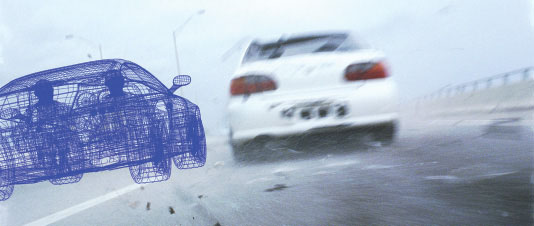“Bad Boys II” by Bay
Conference:
- SIGGRAPH 2004 More animation videos from SIGGRAPH 2004:


Title:
- Bad Boys II
Length:
- 3:39
Director(s):
Company / Institution / Agency:
- Sony Pictures Imageworks
Description:
This compilation demonstrates a number of visual effects and CG
animation processes:
1. The bullet sequence used a high-speed camera (4000 FPS).
2. The continuous helicopter/rave shot seams together various
plates, miniatures, and CG objects, including a CG helicopter,
CG rooftop, and CG pills/tray/spoon/jar.
3. The Causeway chase sequence begins with the proof-of-concept
car, showing the photo-real animation and rendering of a CG
Ferrari next to an actual Ferrari. In addition, the sequence includes
a CG police car, truck, BMW, ND car, and boat.
4. The 360-degree Haitian shootout scenes allow the mind to
envision what the camera cannot physically accomplish: passing
through holes in the broken glass of a door, and through a chair,
bed, and fan.
5. The 3D matte painting showcases an extraordinary transformation.
Taking a helicopter shot of a mansion photographed in Miami,
removing the original background and replacing it with surrounding
buildings, landscape, cars, and people sets the mansion in Cuba.
Hardware:
HARDWARE: SGI 250 MHz single/dual CPU, 2 GB RAM. Rendering farm: 100
CPUs.
Software:
SOFTWARE DEVELOPER: Modeling and animation: Maya 4. Rendering: PRMan 10. Dynamics: Houdini 6. Compositing: Bonsai, Flame 8.3 beta. Additional software: Tracking Yannix Technologies. Custom software: Bonsai, Lighting Birps. OS: Irix 6.5, Linix Renderfarm.
Additional Contributors:
Visual Effects Supervisors: Carey Villegas, Rob Legato
Visual Effects Executive Producer: Jenny Fulle
Computer Graphics Supervisor: Layne Friedman
Digital Artists: Alan Chan, George Ho, Kurt Judson, Zsolt Krajcsik, Daniel La Chapelle, Mark Lefitz, Stephen Lunn, Enrique Munoz
Compositors: Bonjin Byun, Clint Colver, Aaron Smith
IAC Coordinator: Jason Anderson
Production Assistant: Chris Antonini
Lead Production Services Technician: Alfredo R. Barcia
Senior Production Services Technician: Ned Wilson
Resource Administrator: John Sanders
Systems Engineering Manager: Alberto Velez
Senior Systems Engineers: Brian Chase, David Miya
Systems Adminstrator: Joe Stevano
Senior Hardware/Video Engineer: Michael Trujillo
Software Manager: Amit Agrawal
Software Engineers: Andrea Solis, Michael Wilson, Reuben Pasquini
Negative Cutter: Boyd Steer
Assistant Visual Effects Editor: James Bluma
Visual Effects Producer: David Taritero
Visual Effects Production Coordinator: Elizabeth Hitt
Visual Effects Editor: Allen Cappuccilli
IAC Production Manager: Dawn Guinta
Lead Digital Artist: Francis Liu
Interactive Compositors: Brian Battles, Rob Blue, Christian Boudman, Max Harris, Cesar Romero, Donovan Scott, David Takayama
Lead Animator: Gary Abrahamian
Animator: Brian Schlinder
Pre-vis Animators: Renato Dos Anjos
Animation Support: Maks Naporowski
Texture Painters: Josh Geisler-Amhowitz, Jennifer Jung Kim
Modeler: Sergio Garcia-Abad
Roto Artists: Nathalie Gonthier, Michael Kaelin
Matchmove Artists: Rachel Nicoll, David Spencer
Editorial Coordinator: Nikki Bell
Additional Information:
PRODUCTION
Modeling: Lydar scans and subdivision surfaces. Some 2D rotoscoping
used. Rendering technique used most: Raytraced with RenderMan.
Average CPU time for rendering per frame: 4 layers approximately
2.5 hours. Total production time: 205 days.




